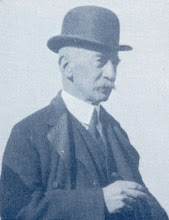Pronounced "ball-YAR-tzuh": an unsettling word denoting a form of theatre briefly popular in pre-Nazi Bohemia, explicitly written for the devil.
Orgies, animal sacrifice, blood-drinking, and the rest of Satanism's drear catalogue featured prominently in the work of this radical theatre group artistically and philosophically triangulated in the humid, teeming crotch connecting Brecht to Artaud. According to sources, the Baaljartzers claimed for their artistic godfathers (my word) an apocryphal splinter group from Exodus, who did not shall-we-say cotton to Moses's Commandments, preferring to plow greasier soils.
The founding philosopher and director of the Baaljartze movement, a sepulchral woman called only "Weis", was famous for saying that the entire human spectrum of existence was theatre for the devil; her only gripe being that it was cast with amateurs.
21.5.15
Tantovelt
Received in the mail today a letter from an old school chum who, exhumed from his home by visiting kin, was gobsmacked by a touring art installation.
According to my chum, on the ebbing side of the middle part of the last century, a Greek playground designer named Antithenes Tantopolis believed that "life lessons will be designed into the playscapes of children whilst they are at their play lessons." (Chum's wording? The Greek's? The letter is unclear.) Accordingly, an early prototype of the "Tantovelt slide" featured a 90-degree turn and a hole a foot wide immediately preceding the end of the slide.
Another Tantovelt piece was a set of monkey bars with "false grasps", or, hinged rubber "falling bars"--interspersed with the solid regular sort--that caused children to drop perilously close to the ground.
Not a horrible idea in a platonic sense, but perhaps the boardroom might've benefited from a lawyer's presence?
Reasonable people might marvel that such a patently dangerous concept could find expression in a world helmed by adults. Happily, I come bearing explanation: a relative of Tantopolis, who served as the headmaster of a private school in rural England, positively raved about his relation's forward-thinkingness and ingenuity; he gave the Greek designer his first and only contract, and was in the fullness of time found to be criminally insane. While the schoolmaster vanished from the human record, the so-called "Tantovelt slide" exists today as a traveling art installation upon which children are not, alas, permitted to play.
According to my chum, on the ebbing side of the middle part of the last century, a Greek playground designer named Antithenes Tantopolis believed that "life lessons will be designed into the playscapes of children whilst they are at their play lessons." (Chum's wording? The Greek's? The letter is unclear.) Accordingly, an early prototype of the "Tantovelt slide" featured a 90-degree turn and a hole a foot wide immediately preceding the end of the slide.
Another Tantovelt piece was a set of monkey bars with "false grasps", or, hinged rubber "falling bars"--interspersed with the solid regular sort--that caused children to drop perilously close to the ground.
Not a horrible idea in a platonic sense, but perhaps the boardroom might've benefited from a lawyer's presence?
Reasonable people might marvel that such a patently dangerous concept could find expression in a world helmed by adults. Happily, I come bearing explanation: a relative of Tantopolis, who served as the headmaster of a private school in rural England, positively raved about his relation's forward-thinkingness and ingenuity; he gave the Greek designer his first and only contract, and was in the fullness of time found to be criminally insane. While the schoolmaster vanished from the human record, the so-called "Tantovelt slide" exists today as a traveling art installation upon which children are not, alas, permitted to play.
Biccum
Well here's a little something novel for you: supping with a fellow lexicographer recently at a small, rustic clamshack conscientiously unadvertised to the touring throngs of lighthouse peepers, my colleague and I were delighted to make a linguistic discovery. The matron of the establishment, draped all over with laconic New England flesh ensconced within an old and obviously well-loved dress, asked us would we have biccum with our side salads. "Biccum?" we echoed, perplexed. After a sequence of feints, volleys, false surrenders and pincer movements, we managed to extract the word's biography from her.
"Biccum" is a salad dressing or dipping sauce incorporating bonemeal. Evidently originating in Finland (circa 17C), the process was born during an especially brutal winter. The bones of livestock were employed in making a nutrient-rich stock which was then "fined" (a process of thickening catalyzed by dried, minced fish bladder). The finished product made for a healthy and flavorful vegetable dressing.
And how did it taste? Savory yet mild, with a spot of chalk--or so reported my colleague. I am afraid my stomach's lifelong war against sauce curbed my appetite for the delicacy. (It probably didn't help that the matron refused to tell us from which animal the bones had been culled. One thinks, against one's will, of a sort of cannibal roulette: a depraved entertainment ancient Finns nicked from winter's white-feathered coat.)
"Biccum" is a salad dressing or dipping sauce incorporating bonemeal. Evidently originating in Finland (circa 17C), the process was born during an especially brutal winter. The bones of livestock were employed in making a nutrient-rich stock which was then "fined" (a process of thickening catalyzed by dried, minced fish bladder). The finished product made for a healthy and flavorful vegetable dressing.
And how did it taste? Savory yet mild, with a spot of chalk--or so reported my colleague. I am afraid my stomach's lifelong war against sauce curbed my appetite for the delicacy. (It probably didn't help that the matron refused to tell us from which animal the bones had been culled. One thinks, against one's will, of a sort of cannibal roulette: a depraved entertainment ancient Finns nicked from winter's white-feathered coat.)
Subscribe to:
Comments (Atom)














